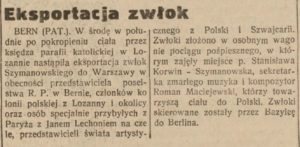1930
Maciejewski becomes the conductor of the Stanisław Moniuszko Singing Society.
He writes Kurpie Songs inspired by the folklore of the Kurpie region.
- R. Maciejewski, The Kurpie Songs, cover
13 April — first modern art exhibition in Łódź marks the beginning of the existence of the Museum of Art, one of the world’s oldest institution of this kind dedicated to modern art.
17 June – Karol Szymanowski becomes the rector of the Warsaw Academy of Music, formerly State Conservatoire of Music.
23 December – premiere of Igor Stravinsky’s Symphony of Psalms.
1931
Maciejewski graduates from the Poznań Conservatoire and is admitted to the School of Music in Warsaw. He would study piano with Józef Turczyński and composition with Kazimierz Sikorski. In Warsaw he meets Kazimierz Kranc, Grażyna Bacewicz (who would complete her studies with Sikorski in 1932) and Witold Lutosławski. Lutosławski remembered his older colleague as follows:
“He was a star among the students at the time. He even conducted his own pieces performed by a student choir in which I sang as well. I remember, for example, a cycle of very beautiful Kurpie Songs.”
In October Maciejewski begins working as a pianist at Teatr Polski; he would later also work as an accompanist at the Polish Radio and Janina Mieczyńska’s ballet school.
First meeting with Karol Szymanowski. Maciejewski described it in a letter to Marcella Hildebrandt of 13 November:
“He made an extraordinary impression on me. He is immensely kind and charming. He became interested in me and promised to introduce me to Rubinstein, I am supposed to come to Szymanowski, if I write anything new.”
Karol Szymanowski leaves the Warsaw Academy of Music.
6 October — beginning of the so-called Brest trials, against the centre-left opposition.
19 December – opening of the Institute of Art Propaganda
Edmund Husserl writes his fundamental philosophical work, The Cartesian Meditations.
Katarzyna Kobro and Władysław Strzemiński publish the treatise Composition of Space and Calculations of Space-Time Rhythm.
1932
More compositions by Maciejewski for piano: Zbójnicki and Krzesany, Sonata, Triptych and Songs of Bilitis for soprano and piano.
Maciejewski becomes the leader of a student strike against the decision to reform the Warsaw State School of Music and is expelled. Years later he recalled:
“Although I’m anti-organisational creature, I ran from class to class, pugnaciously calling for a boycott of lectures, for which I was later expelled from the school.”
Maciejewski’s four Mazurkas are published.
The composer spends his holidays in the Tatra Mountains, which would remain his fascination until the end of his life.
8 November — Maciejewski performs as a pianist at a concert of the Institute of Art Propaganda. In addition to his own works, the programme features pieces by Szałowski and Neuteich. The composer meets Józef Beck at the concert.
4 January — premiere of Ravel’s Piano Concerto in G major in Paris.
25 July — the Polish government sings a non-aggression pact between Poland and the USSR.
Publication of Aldous Huxley’s dystopian novel Brave New World.
Publication of Louis-Ferdinad Céline’s book Journey to the End of the Night.
1933
June/July – thanks to Józef Beck’s protection Maciejewski goes on his first foreign concert tour (performing in Sofia and Belgrade, among others).
Maciejewski’s Songs of Bilitis are performed at the Polish Music Festival in Nice.
23 January – premiere of Béla Bartók’s Piano Concerto No. 2 in Frankfurt.
30 January — Adolf Hitler becomes chancellor of the Third Reich.
23 December — Paul Klee leaves Germany and emigrates to Switzerland.
1934
Maciejewski spends his summer holidays with the Becks on the Baltic Sea in Orłowo.
He receives a government scholarship to go to Paris, where he stays at the Polish House in Lamande Street and meets Czesław Miłosz and a young Polish pianist, Halina Czerny-Stefańska, whom he gives lessons.
He joins the Association of Young Polish Musicians in Paris and has private lessons with Nadia Boulanger.
12 March — premiere of Paul Hindemith’s symphony Mathis der Mahler in Berlin.
29–30 June – at night Hitler arrests the SA leaders; most of them would soon be killed. The event would later come to be known as the Night of the Long Knives.
Maria Dąbrowska completes the fourth (and last) volume of her epic novel Nights and Days.
1935
The first performance of a Maciejewski piece in Paris – Songs of Bilitis are presented and a concert hosted by Nadia Boulanger.
16 December – Maciejewski becomes secretary of the Association of Young Polish Musicians in Paris.
8 April — premiere of Béla Bartók’s String Quartet No. 5 in Washington.
12 May — death of Józef Piłsudski.
Publication of Zofia Nałkowska’s novel – Boundary.
1936
25 March — the premiere of Maciejewski’s Concerto for Two Pianos at the Salle Pleyel in Paris (performers: the composer and Kazimierz Kranc) is a great success for the young composer.
6 April – Maciejewski becomes deputy president of the Association of Young Polish Musicians in Paris (he would perform this function only until 24 October 1936).
In autumn he lives in Montmartre, near the Rubinsteins, who tries to help the young composer.
27 April — the premiere of Karol Szymanowski’s ballet Harnasie in Paris is a great success.
17 July – beginning of the Civil War in Spain.
19 August – Federico García Lorca is killed in Spain.
1937
January — Maciejewski’s concerts in London. The composer meets the famous choreographer Kurt Jooss.
In February Maciejewski comes to Poland, where the Concerto for Two Pianos had its Polish premiere in Warsaw on 23 February.
While spending Easter in Geneva with his friends, the Rajchman family, Maciejewski receives the news about Szymanowski’s critical condition.
29 March – Maciejewski arrives in Lausanne a few hours after Szymanowski’s death. He assists the composer’s sister in transferring Szymanowski’s body to Poland.
- Press clip, “Robotnik”, 2.04.1937, p. 5.
Maciejewski spends summer in Brittany and Marseille, and returns to Paris in autumn. He starts having health problems in that period.
29 March — Karol Szymanowski dies in Lausanne.
26 April – Guernica is bombed by the Germans. To commemorate the event, Pablo Picasso creates his famous painting that same year.
23 August — Albert Roussel dies in Royen.
19 July — the Nazis organise the Entartete Kunst exhibition in Munich.
1938
Invited by Kurt Jooss, Maciejewski comes to Dartington Hall in England, where he is to write music to the famous choreographer’s ballets. At Dartington Hall Maciejewski meets a Swedish dancer, Elvi Galeen.
19 December – Maciejewski marries Elvi Galeen. He describes his wife in a letter to his brother Zygmunt: “Elvi is considered a beauty, she’s very charming, intelligent and hungry for knowledge, she has a great sense of responsibility at work, has an extraordinary intuition when it comes to art, speaks five languages perfectly and is exceptionally talented as a dancer.”
Maciejewski writes new pieces for piano: Lullaby and Tarantella.
16 January — Benny Goodman performs the first jazz concert at Carnegie Hall.
12 March — German troops enter Austria.
29–30 September — during the Munich conference an agreement is concluded to incorporate part of Czechoslovakia into the Third Reich.
9–10 November – pogrom of the Jews in Germany known as the Kristallnacht.
1939
In August Maciejewski travels to Sweden to meet his wife’s family. The newlyweds initially live with Maciejewski’s mother-in-law, with whom the relations are not good from the very beginning. After the outbreak of the war Roman and his wife move in with Axel Adler, Elvi’s very rich uncle.
1 September – Nazi Germany’s attack on Poland begins the Second World War.
17 September — hearing the news of the Soviet troops’ attack on Poland, Stanisław Ignacy Witkiewicz commits suicide.
James Joyce writes his most hermetic work, Finnegans Wake.

